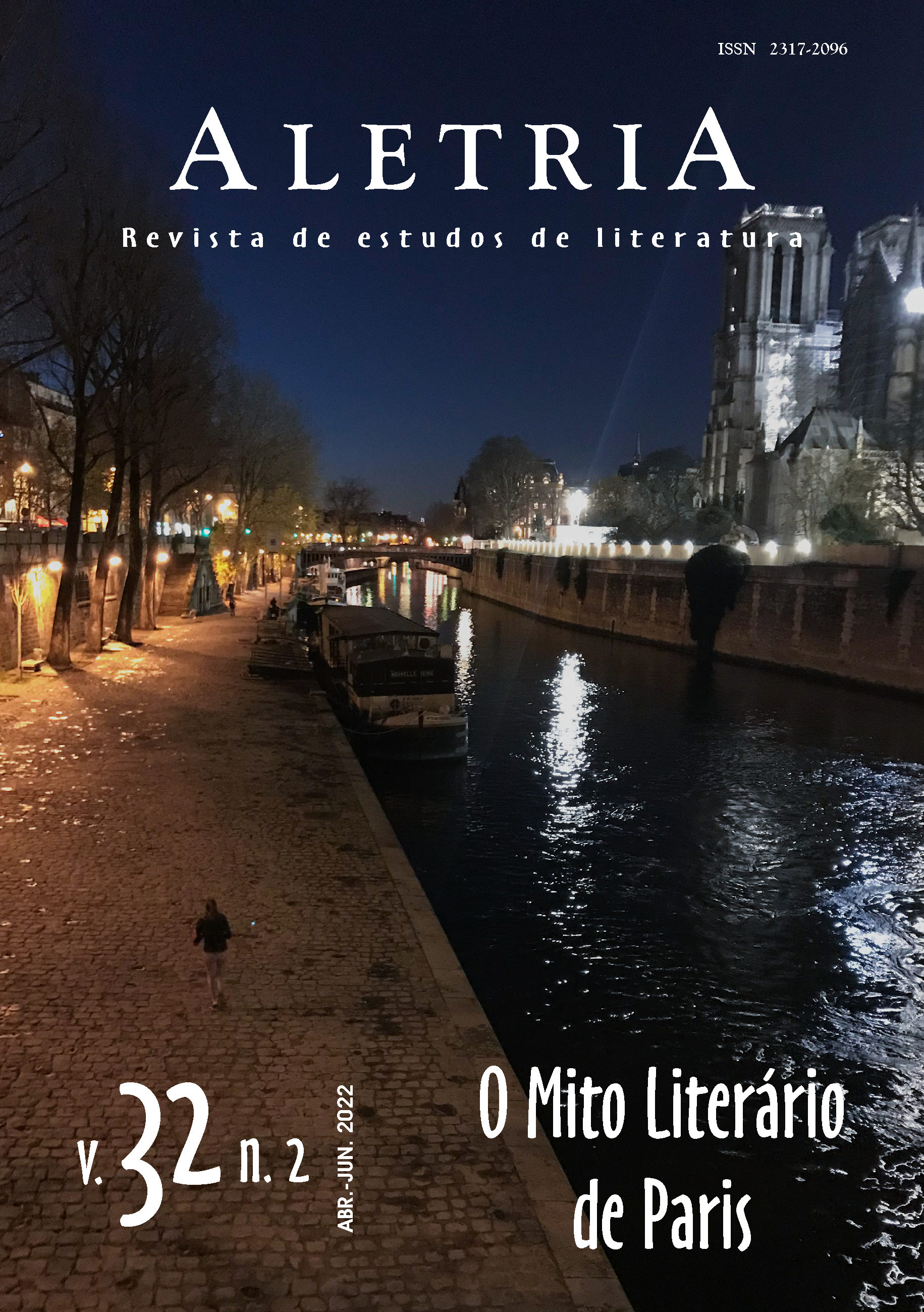In Space We Read Time
(Paris, Jacques Austerlitz, W. G. Sebald)
DOI:
https://doi.org/10.35699/2317-2096.2022.37946Keywords:
Paris, National Library, Jacques Austerlitz, W. G. Sebald, Karl SchlögelAbstract
This paper consists of three movements: the first discusses Karl Schlögel’s ideas presented in his book In Space We Read Time (2003); the second is a critical analysis of the novel Austerlitz, by W. G. Sebald, focusing on the mobilization of the city of Paris; the third and last one further examines the questions raised in the previous two sections, identifying in Sebald’s work an imaginative prospection of the repressed layers of urban experience. Austerlitz represents Paris as an excerpt that focuses on the National Library of France and its surroundings, from World War II to the late 1990s. The emergence of this architectural enterprise is evoked by Sebald under the sign of ambivalence: a place of memory and oblivion, a space of “light” and “darkness”, a site of creation and destruction.
Downloads
References
AGAMBEN, Giorgio. Un importante ritrovamento di manoscritti di Walter Benjamin. Aut Aut, Florença, n. 189-190, p. 4-6, 1982.
BENJAMIN, Walter. Magia e técnica, arte e política: ensaios sobre literatura e história da cultura. Tradução de Sergio Paulo Rouanet. São Paulo: Brasiliense, 1985.
BUCK-MORSS, Susan. Dialética do olhar: Walter Benjamin e o projeto das Passagens. Tradução de Ana Luiza de Andrade. Belo Horizonte: Editora UFMG; Chapecó: Editora Universitária Argos, 2002.
COWAN, James L. Sebald’s Austerlitz and the Great Library: a Documentary Study. In: FISCHER, Gerhard (org.). W. G. Sebald: Schreiben ex patria/Expatriate Writing. Amsterdã: Rodopi, 2009. p. 193-212.
CURTIUS, Ernst Robert. Literatura europeia e Idade Média latina. Tradução de Teodoro Cabral (com colaboração de Paulo Rónai). São Paulo: Edusp, 2013.
FERRARIS, Maurizio. Documentalità: perché è necessario lasciar tracce. Roma: Laterza, 2009.
FIGUEIREDO, Eurídice. A pós-memória em Patrick Modiano e W. G. Sebald. Alea: Estudos Neolatinos, Rio de Janeiro, v. 15, n. 1, p. 137-151, 2013.
HILBERG, Raul. A destruição dos judeus europeus. Tradução de Carolina Barcellos. Barueri: Amarilys, 2016.
HOUELLEBECQ, Michel. Submissão. Tradução de Rosa Freire Aguiar. São Paulo: Alfaguara, 2015.
JACOBS, Carol. Sebald’s Vision. Nova York: Columbia University Press, 2015.
KLEINBERG, Ethan. Haunting History: for a Deconstructive Approach to the Past. Stanford: Stanford University Press, 2017.
KOSELLECK, Reinhart. Estratos do tempo: estudos sobre história. Tradução de Markus Rediger. Rio de Janeiro: Contraponto: PUC-Rio, 2014.
MARGEL, Serge. Arqueologias do fantasma: técnica, cinema, etnografia, arquivo. Tradução de Maurício Chamarelli e Anne Dias. Belo Horizonte: Relicário, 2017.
MARI, Michele. Tutto il ferro della torre Eiffel. Turim: Einaudi, 2002.
MODIANO, Patrick. Para você não se perder no bairro. Tradução de Bernardo Ajzenberg. Rio de Janeiro: Rocco, 2015.
MURRAY, Simon. Fields of Association: W. G. Sebald and contemporary performance practices. In: BAXTER, Jeannette (org.). A Literature of Restitution: Critical Essays on W. G. Sebald. Manchester: Manchester University Press, 2013. p. 187-202.
NICHOLAS, Lynn H. Europa saqueada: o destino dos tesouros artísticos europeus no Terceiro Reich e na Segunda Guerra Mundial. Tradução de Carlos Malferrari. São Paulo: Companhia das Letras, 1996.
SCHLÖGEL, Karl. En el espacio leemos el tiempo: sobre historia de la civilización y geopolítica. Tradução de José Luis Arántegui. Madri: Siruela, 2007.
SCHLÖGEL, Karl. Im Raume lesen wir die Zeit. Über Zivilisationsgeschichte und Geopolitik. Frankfurt: Fischer Verlag, 2006.
SCHLÖGEL, Karl. In Space We Read Time: On the History of Civilization and Geopolitics. Tradução de Gerrit Jackson. Nova York: Bard Graduate Center, 2016.
SCHLÖGEL, Karl. Leggere il tempo nello spazio. Saggi di storia e geopolitica. Tradução de Lisa Scarpa. Milão: Bruno Mondadori, 2009.
SCHÖTTKER, Detlev. Dolf Sternberger und Walter Benjamin: ein Photographie-Aufsatz und seine Folgen. Sinn und form, Berlim, v. 62, n. 4, p. 437-444, 2010.
SEBALD, Winfried Georg. Austerlitz. Tradução de José Marcos Macedo. São Paulo: Companhia das Letras, 2008a.
SEBALD, Winfried Georg. Guerra aérea e literatura: com ensaio sobre Alfred Andersch. Tradução de Carlos Abbenseth e Frederico Figueiredo. São Paulo: Companhia das Letras, 2011.
SEBALD, Winfried Georg. Os anéis de Saturno: uma peregrinação inglesa. Tradução de José Marcos Macedo. São Paulo: Companhia das Letras, 2010a.
SEBALD, Winfried Georg. Os emigrantes: quatro narrativas longas. Tradução de José Marcos Macedo. São Paulo: Companhia das Letras, 2009.
SEBALD, Winfried Georg. Pátria apátrida: ensaios sobre literatura austríaca. Tradução de Telma Costa. Lisboa: Teorema, 2010b.
SEBALD, Winfried Georg. Vertigem. Sensações. Tradução de José Marcos Macedo. São Paulo: Companhia das Letras, 2008b.
SEVCENKO, Nicolau. O outono dos césares e a primavera da história. Revista USP, São Paulo, n. 54, p. 30-37, 2002.
STERNBERGER, Dolf. Panorama of the Nineteenth Century. Tradução de Joachim Neugroschel. Nova York: Mole Editions, 1977.
VILA-MATAS, Enrique. Doutor Pasavento. Tradução de José Geraldo Couto. São Paulo: Cosac Naify, 2009.
VILA-MATAS, Enrique. Paris não tem fim. Tradução de Joca Reiners Terron. São Paulo: Cosac Naify, 2007.
WOLFF, Lynn L. W. G. Sebald’s Hybrid Poetics: Literature as Historiography. Berlim: De Gruyter, 2014.
Downloads
Published
Issue
Section
License
Copyright (c) 2022 Kelvin Falcão Klein (Autor)

This work is licensed under a Creative Commons Attribution 4.0 International License.
Authors who publish with this journal agree to the following terms:Authors retain copyright and grant the journal right of first publication with the work simultaneously licensed under a Creative Commons Attribution Non-Commercial No Derivatives License that allows others to share the work with an acknowledgement of the work's authorship and initial publication in this journal.Authors are able to enter into separate, additional contractual arrangements for the non-exclusive distribution of the journal's published version of the work (e.g., post it to an institutional repository or publish it in a book), with an acknowledgement of its initial publication in this journal.Authors are permitted and encouraged to post their work online (e.g., in institutional repositories or on their website) prior to and during the submission process, as it can lead to productive exchanges, as well as earlier and greater citation of published work (See The Effect of Open Access).









